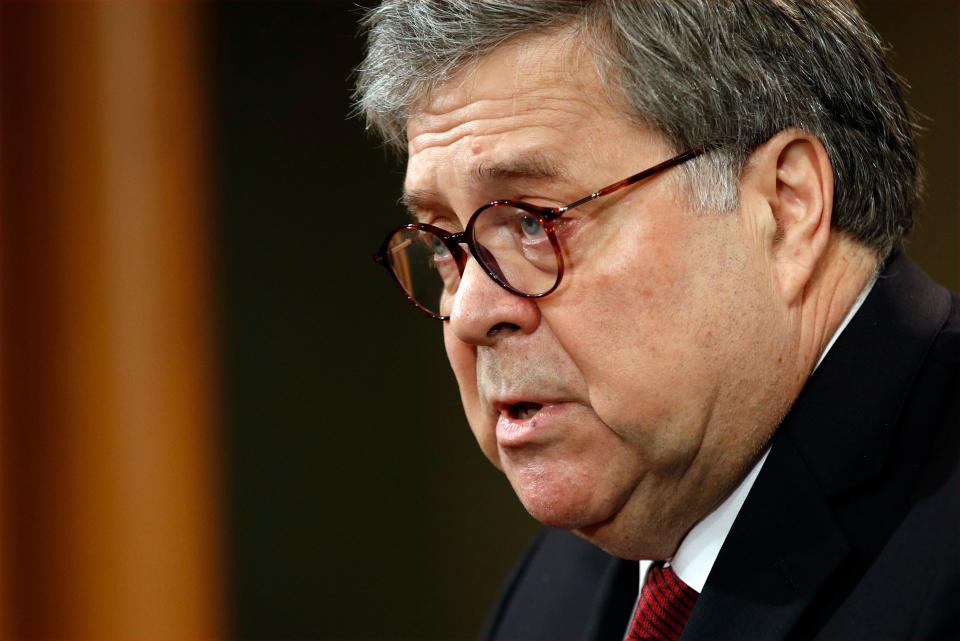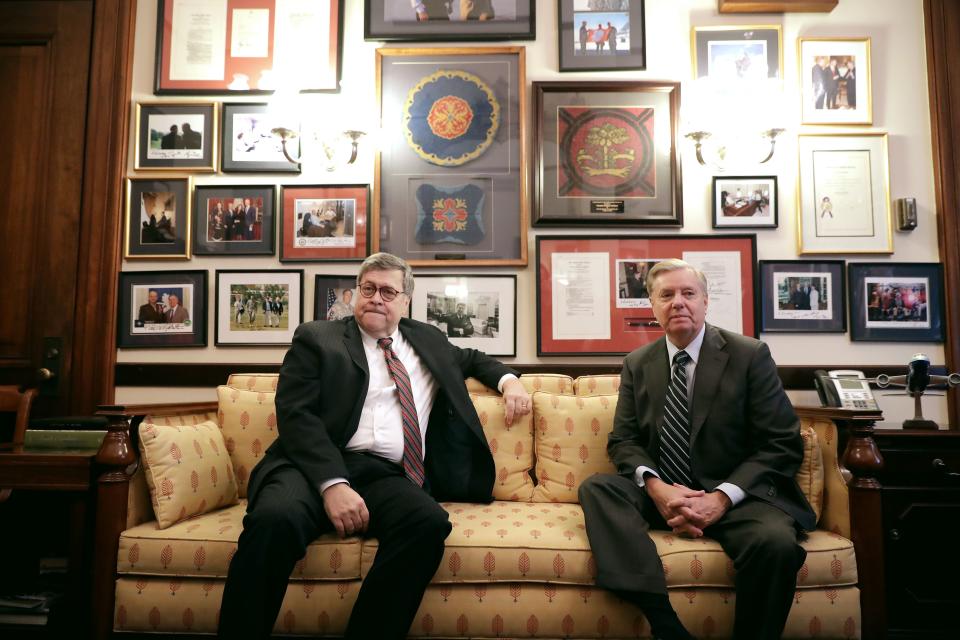AG William Barr steps into Russia probe firestorm with two Congressional appearances
WASHINGTON — Attorney General William Barr had hoped that briefing reporters just before he finally released the report detailing an investigation into Russian election interference and President Donald Trump's attempts to thwart it would put to rest questions about his handling of the probe.
It did not. Since leaving the Justice Department podium that morning, the political firestorm surrounding Barr has only intensified. Now he is set to face a restive Congress whose members remain bitterly divided over how special counsel Robert Mueller's report should guide their parties' political futures.
Barr is scheduled to appear Wednesday before the Republican-controlled Senate Judiciary Committee, and on Thursday before a Democratic-controlled panel in the House. But even the seemingly routine matter of arranging his testimony has proved contentious, and Barr and lawmakers had yet to reach an agreement on Wednesday evening on the format for how he would be questioned by the House committee.
The House dispute, with Democrats threatening to force Barr's testimony by subpoena and Republicans seeking to move on from an investigation that has largely consumed Trump's presidency, has only underscored the harsh partisan backdrop to what could be the most consequential days of Barr's short tenure as attorney general.
The Senate panel, chaired by staunch Trump ally Lindsey Graham of South Carolina, is the friendlier of the two venues. But even there, lawmakers have said they expect to grill him on his views on whether the president's conduct amounted to obstruction and whether he misrepresented the substance of Mueller's report to favor Trump in a summary of the report's findings about a month before it was released to the public.
"It seems clear from what I’ve read of the special counsel’s report and what I’ve been briefed on, that President Trump repeatedly attempted to obstruct justice and only the refusal of his core team to carry out his directives prevented him from being successful in doing so," said Sen. Chris Coons, D-Del., a Judiciary panel member. "That raises pretty basic questions that I think the American public and Congress should have been alerted to rather than having that buried in the summary of the report."
Sen. John Kennedy, R-La., meanwhile, cast the dispute over Mueller's report as a clear attempt by the Democrats to damage the president in the run-up to the 2020 election.
"I think the report speaks for itself and it’s 448 pages," said Kennedy, who also sits on the Judiciary committee. "Mueller’s gone home; he’s gone back to the house or his job... I think the American people think it’s finished. I think the only people who think it isn’t finished are the members of the House and a couple of members of the Senate who just hate Trump."
(Mueller remained at work Tuesday and is expected to complete his service soon, his spokesman, Peter Carr, said.)
Read the report: Read special counsel Robert Mueller's report into President Trump, Russian interference
More: Did Trump encourage Michael Cohen to lie? ... And other mysteries the Mueller report didn't resolve
Obstruction
In both the Senate and the House, Democrats have signaled that they will press Bar on his decision to effectively clear Trump of criminal liability in the face of substantial evidence that the president sought to reign in the 22-month investigation that clouded the first years of his administration or shut it down, altogether.
Mueller's report detailed 10 episodes of possible obstruction, including efforts by Trump to dismiss Mueller and order then-Attorney General Jeff Sessions to make public statements characterizing the probe as unfair.
None of the attempts succeeded, largely because White House Counsel Don McGahn declined to carry out Trump's directive to sack Mueller, while political adviser Corey Lewandowski never successfully passed the president's message to Sessions.
In a summary of Mueller's conclusions published March 24, Barr said that he and Deputy Attorney General Rod Rosenstein took action to clear the president because Mueller's team did not reach a conclusion on whether the president's actions constituted a crime. Barr later claimed during the Justice briefing earlier this month that "there is substantial evidence to show that the president was frustrated and angered by a sincere belief that the investigation was undermining his presidency."
Democrats, meanwhile, have asserted that any decision on obstruction should have been left to Congress, not the Trump-nominated attorney general. They pointed to a passage in Mueller's report that they contend implied that lawmakers could take up the matter in a possible impeachment proceeding.
The report stated that Congress "can validly make obstruction-of-justice statutes applicable to corruptly motivated official acts of the president without impermissibly undermining his (presidential) functions."
“Everybody is asking about that," Sen. Dianne Feinstein, D-Calif., the panel's ranking Democrat, said. "I think the most important thing for me is that this is a man (Barr) guided by the Constitution and the law not the president."

The Barr press briefing
Mueller's final report was just a couple of hours from public release when Barr took the stage at the Justice Department and offered a ringing defense of the president.
Most striking were the echoes of a Trump stump speech embedded in the text.
While Mueller's report examined the central question of whether Trump conspired with the Russian government to tilt the election in the Republican's favor, Barr repeatedly chose a familiar refrain used by the president to deny any wrongdoing.
"So that is the bottom line," Barr declared at one point. "After nearly two years of investigation, thousands of subpoenas and hundreds of witness interviews, the special counsel confirmed that the Russian government sponsored efforts to illegally interfere with the 2016 presidential election but did not find that the Trump campaign or other Americans colluded in those schemes."
The choice of language immediately raised questions among some Democrats about the purpose of the briefing. The report detailed numerous contacts between Trump aides and Russians and a campaign eager to benefit from Russian support, and pointedly declined to use the word "collusion" to describe the investigation.
Barr also acknowledged that Justice Department allowed Trump's personal attorneys to read a final version of a "redacted" report before its public release.
"The president's personal lawyers were not permitted to make, and did not request any redactions," Barr said.
Nonetheless, the acknowledgement has raised increasing suspicions among Democrats about Barr's impartiality.
Sen. Mazie Hirono, D-Hawaii, Tuesday asked the Justice Department's inspector general to review whether Barr's handling of the matter breached department guidelines.
"Attorney General Barr's decision to hold a press conference to assert his own views regarding the report well before releasing the reacted report...warrant serious scrutiny as to whether they were proper and consistent with Justice Department policies and practices," said Hirono, another Judiciary panel member.
Kennedy, the Louisiana Republican, said the questions raised by Democrats in both the Senate and House amounted to "legislative oversight in bad faith."
"This is all about the 2020 election and I don’t blame the president for pushing back," Kennedy said, referring to Trump's recent vow to challenge Congress' every request for information and testimony.
"I just want to hear what he (Barr) has to say," Kennedy said.
Access to the Mueller's full report
The day after Barr released a redacted version of the Mueller report in April, House Democrats raised the ante: they issued a subpoena for the complete versions, with no information blacked out.
House Judiciary Chairman Jerrold Nadler, D-N.Y., dropped the demand on Barr, expressing his dissatisfaction with the partly blacked-out copy that the attorney general delivered to Congress and the public.
Among the redacted material were references to a dozen still-secret investigations that were spun-off from Mueller's probe and now are being handled by federal prosecutors in other offices.
While Mueller's conclusions were largely confined to whether Trump or others committed federal crimes, Congress has broader options, ranging from holding hearings to amplify the report's findings, passing legislation or potentially pursuing impeachment proceedings.
House Speaker Nancy Pelosi, D-Calif., said impeachment – the political equivalent of bringing charges against the president – is not yet in the cards.
Short of providing the un-redacted version to Congress, Barr had offered to allow some lawmakers limited access to a less-edited version of the report. Republicans agreed, but Democrats have so far refused.
"Given the comprehensive factual finding presented by the special counsel's report, some of which will only be fully understood with access to the redacted material, we cannot agree to the conditions you are placing on our access to the full report," Pelosi and Senate Minority Leader Chuck Schumer, D-N.Y., said in a letter to Barr following the report's release.
Barr's spy review
In the days before Mueller's report was made public, Barr told a Senate panel that he was reviewing whether federal authorities improperly spied on Trump's campaign during the early stages of the investigation into whether any of his aides participated in Russian efforts to sway the 2016 election in Trump's favor.
"Spying on a campaign is a big deal," Barr told a Senate panel Wednesday. "I think spying did occur. The question is whether it was adequately predicated."
The attorney general said he planned to examine the "genesis and the conduct" of the FBI's investigation into possible ties between the Trump campaign and Russia, launched in the midst of the 2016 presidential run. The inquiry was ultimately turned over to special counsel Robert Mueller to complete, and Barr has said it concluded that Trump's campaign did not conspire with the Russian government.
"I am not saying that improper surveillance occurred," Barr told the Senate Appropriations subcommittee. "I am concerned about it. There is a basis for my concern."
Barr's statement was lauded by congressional Republicans who have pressed for such a review, often claiming without evidence that Mueller's investigation was illegitimate because it was based on surveillance abuses by the FBI.
Among those who have pushed for such a review is Graham, head of the Senate panel.

In an interview Tuesday with USA TODAY, Graham said little about what he expected from Barr.
"Just show up and you’ll hear," Graham said. "Show up. Show up. Show up.”
He offered more to CBS News on Sunday, declaring questions about Trump's conduct closed and saying it was time to look more closely at the investigation.
"I think the idea that this president obstructed justice is absurd," Graham said. "He turned over a million documents to the special counsel. Almost everybody around him testified. I can't think of one thing that President Trump did to stop Mueller from doing his job. He never claimed executive privilege. From my point of view I've heard all I need to really know. Now I want to look at it and find out how all this happened."
USA TODAY App: Like what you’re reading? Download the USA TODAY app for more.
This article originally appeared on USA TODAY: AG William Barr steps into Russia probe firestorm with two Congressional appearances

